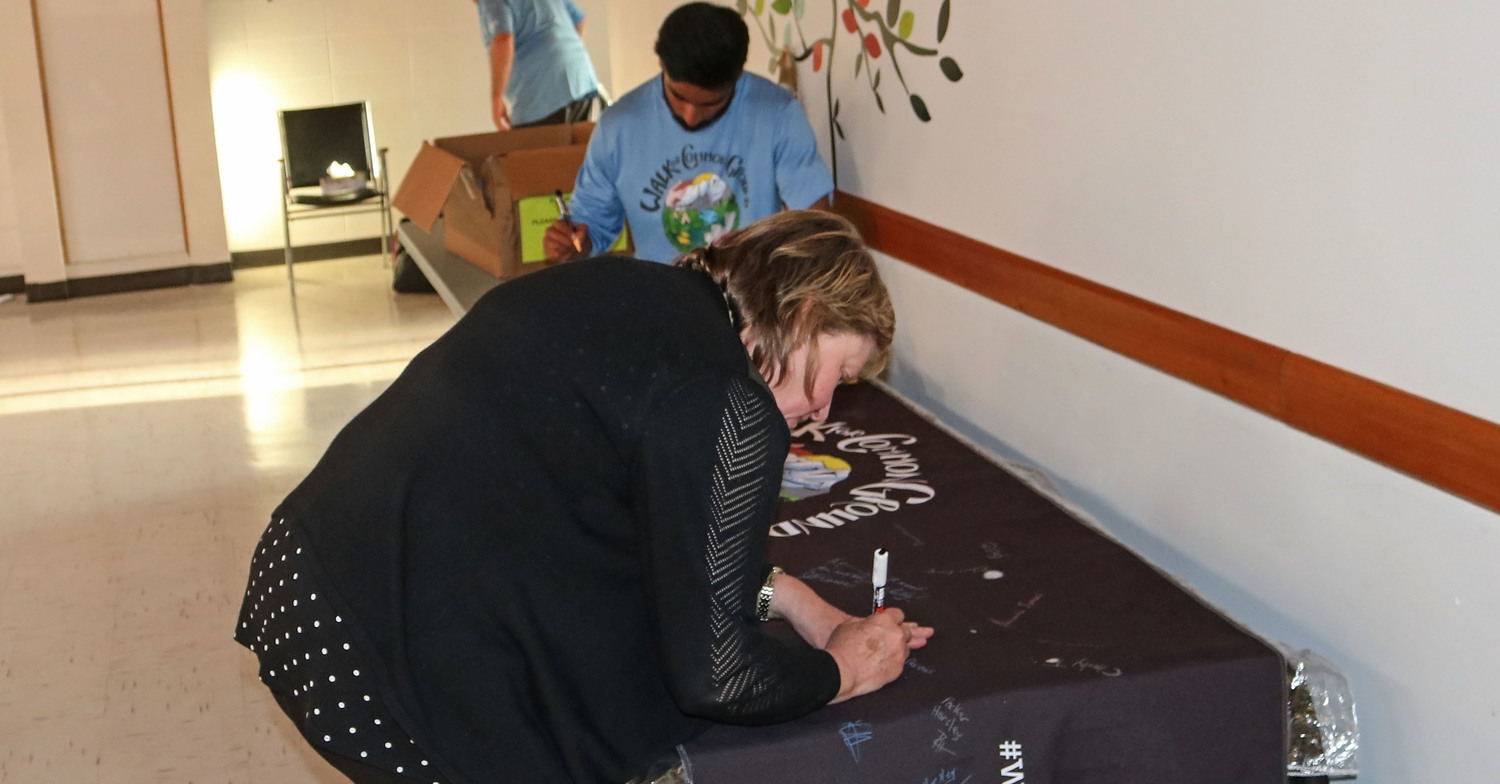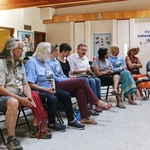Carrying an eagle staff in memory of Saddle Lake Cree Nation educator and former nuhelot’įne thaiyots’į nistameyimâkanak Blue Quills University President Vincent Steinhauer, and the flags of Treaties 6 and 7, Indigenous and non-Indigenous people from communities across Canada joined members of Mennonite Church Canada, the Health Sciences Association of Alberta (HSAA) and the Anglican Dioceses of Edmonton and Calgary, in the 2019 Walk for Common Ground pilgrimage. Intended to honour the sacred covenants of the traditional lands of Cree, Saulteaux, Blackfoot, Métis and Nakota Sioux peoples, the common ground walk spanned more than 15 days, May 31 to June 14, and more than 350 kms, from Edmonton to Calgary.
Public “Treaty Talks” (click here for more info), a response to the Truth and Reconciliation Commission of Canada’s (TRC) call for sustained, public education and dialogue on treaties, were hosted by a dozen communities along the walk route, including St. Columba Anglican Church in Beaumont, and St. Mary Anglican Church in Ponoka.
Nearing the end of a physically draining, but emotionally and spiritually uplifting day which had begun with a warm reception and send-off from Maskwacis, the exhausted walkers arrived Wednesday evening, June 5, at St. Mary’s in Ponoka/pəˈnoʊkə (Blackfoot word for elk). Unloading their overnight bags and sleeping mats in the church hall, they charged their phones to check in with their families before sitting down for a much appreciated supper of barbecued burgers provided by an HSAA volunteer.
As they shared a meal together, the walkers were joined by community members to watch a film highlighting our responsibilities as treaty partners. The documentary, Treaty Talk: Sharing the River of Life, was filmed in Treaty 6 Territory, in and around Saddle Lake Cree Nation and St. Paul, and features the Blue Quills Culture Camp. Treaty Talk is an educational tool intended to help viewers understand our collective responsibility to treaty and to work together to build bridges of understanding. By sharing the traditional Cree understanding of natural law and treaty, grounded in the fundamental and universal values of honesty, kindness, strength and sharing, the film explores and models how Indigenous nations and non-Indigenous allies can work together to end systemic racism, and live side-by-side, equally sharing this land.
The film’s executive producer, Dr. Patricia Makokis from Saddle Lake Cree Nation, a past president of Blue Quills University who now works in Indigenous relations at the University of Alberta, helped lead the walk.
“We know that Canadians don’t know much about our treaties and that we, non-Indigenous peoples, are treaty family too,” said Steve Heinrichs, Director of Indigenous-Settler Relations, Mennonite Church Canada.
Heinrichs is passionate about the church’s call to solidarity and reconciliation with our host peoples and has produced many reconciliation-related resources which can be accessed from the Common Word website.
Interviewed May 31, at the start of the walk from Ivor Dent Sports Park in southeast Edmonton, he said, “Ignorance is a fundamental reason why we have breaks in our relationship. If people understood the histories we’re coming from there would be a lot more potential for mutually respectful relationship. We’re hoping this walk stokes pockets of awareness and energy for people to learn more with Indigenous elders and communities and on their own.”
In the spring of 2017, Heinrichs, along with Mennonite Church Canada and Christian Peacemaker Teams, led a 600-km walk from Kitchener to Ottawa in support of the United Nations Declaration on the Rights of Indigenous Peoples.
“We were specifically responding to Call to Action 48 which is the TRC’s summons for churches to both adopt and implement the declaration, and to do our homework and host public conversations around the declaration while advocating for Bill C-262,” he said. C-262 is now before the Senate committee and must pass its third and final reading before June 21.
“The 2017 pilgrimage helped catalyze settler movement around pushing for 262,” said Heinrichs who is from Winnipeg. He describes the Alberta walk, organized by HSAA, a union representing 240 health sciences disciplines including Paramedics, Dialysis Technicians, Cardiovascular Perfusionists, Psychologists, Mental Health Therapists and Pharmacists; and Mennonite Church Canada and the Anglican Dioceses of Edmonton and Calgary, as “a really eclectic circle.”
“This diverse group of people walking together serves as an icon of many more people who truly care and are trying to work at this. The fact that we are willing to take time and go a couple of weeks with only a few showers and get blisters for one another will hopefully be encouraging to others. We are family trying to love one another and this walk is an act of love,” Heinrichs said.
Scott MacDougall, chair of the HSAA Social Justice Committee, said his union “strives for fairness and equality and health practitioners recognize and are alarmed by the disproportionate number of Indigenous people who suffer.” Indigenous children in Canada are more than twice as likely to live in poverty, and suicide rates among Indigenous peoples are two to three times higher than among non-Indigenous Canadians. To this day, many reserves do not have access to clean water and are plagued by inadequate, overcrowded housing.
Walk for Common Ground participants will reach Calgary this Friday, June 14 and, in so doing, will complete a meaningful act of reconciliation in our continuing journey of understanding, friendship, peace and love.























































